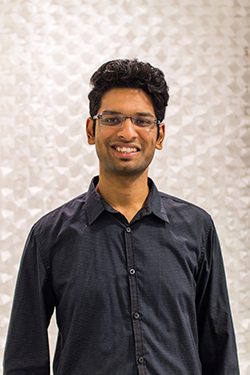Ashutosh feels his programme is very well balanced between theory and application
Ashutosh is 23 years old and comes from the city of Lucknow in India. He pursued his Bachelor's studies in electrical engineering at the Indian Institute of Technology (Jodhpur). Ashutosh loves to travel and explore different cultures, cuisines, architecture.

What made you choose your programme and KTH?
Wireless communication has revolutionized the way we live, helping the world to become a global village by providing new ways to communicate. Not only humans, now we are looking towards machine talking to other machines. With an earnest desire to understand this rapidly evolving field and to contribute, I decide to join the master’s programme in Wireless Systems*.
During the days when I was searching for universities for my master’s, I found out about KTH Master’s Challenge. The entire story about my journey from this mail to winning the competition is covered in this interview given to Sqore after I arrived in Stockholm.
KTH’s School of Electrical Engineering is in the world’s top 20 and the quality of research conducted is widely regarded as one of the best. Owing to these factors, choosing my university became a rather simple process.
What do you like most about your master's programme?
I feel my master’s programme is very well balanced between theory and application. It prepares us to be well-rounded engineers whether it be for industry or continuing research as PhDs. Also, my class constitutes of a highly talented group of students from different parts of the world, with varying levels of experience and diverse academic backgrounds. In such a multivariate environment, I feel my learning process has been significantly enhanced by the interactions I have with my during projects, assignments or even otherwise.
What is your favourite course so far, and why?
Each professor here at KTH adds a degree of ingenuity in the way a course is taught. My favourite so far has been the course on 'Digital Signal Processing' taught by Associate Professor Joakim Jaldén. He employed the methodology of reversing teaching! We were supposed to watch the lectures he prepared a priori and read the associated literature before coming to class. The classroom session then constituted of students discussing a set of questions chosen by him to test the clarity of concepts and their application.
What are your impressions of Stockholm and Sweden?
In my last one year in Sweden, I have been able to experience why it is regarded as the country with the highest living standards. Stockholm is one of the most beautiful cities in the world. It is highly international and, unlike many other European nations, almost everyone understands English! It is quite cold, and sometimes I miss the sun, but the snowy Christmas and New Year compensates for that. Another important aspect of Stockholm is the booming startup scene which has already produced many notable global enterprises like Skype, Spotify and Tobii.
What is your best memory so far from your time at KTH?
The best memory would be the excellent welcome reception organised in the Stockholm City Hall. The sheer grandeur and magnitude of the place, as well as the performances, was quite a start to my studies here at KTH.
What do you think are the differences between studying at KTH and your previous university?
Compared to my previous university, I would say the study environment is much more relaxed, and in general, attitude towards education motivated by learning rather than grades or competition. This is very well reflected in the examination pattern adopted at KTH. All the exams are 5 hours long and allow us to carry all the study material we wish to. The logic behind this is to test the thinking process instead of the pace or memorising capabilities. Another significant difference would be the international mix of students which was not there at my previous university.
What would you like to say to students thinking of choosing KTH for master’s studies?
For reasons mentioned in previous answers, I would highly encourage prospective students to choose KTH for their master’s studies. From my personal experience, I can certainly say that it would provide an upward trajectory to your career. A master’s degree from KTH, especially from the School of Electrical Engineering, is very highly regarded both in academia as well as in the Industry across the world.
I would like to suggest prospective students to look for various scholarship options available and carefully select the programme they wish to enrol. You should also carefully draft your application and keep in mind the deadlines (Swedes are typically very strict about being on time).
* The content of this previously offered programme is now part of the master's programme in Information and Network Engineering

